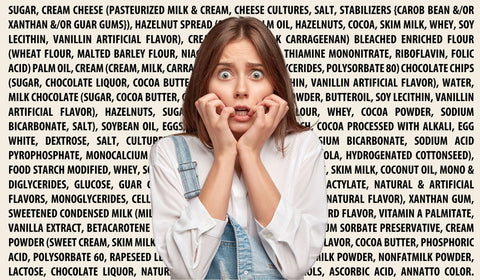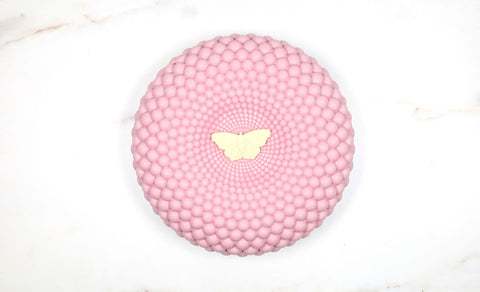When you walk down the aisles of a grocery store or commercial bakery, the allure of brightly decorated cakes is hard to resist. They promise indulgence and celebration, but beneath the surface, these cakes often contain a cocktail of ingredients that could be detrimental to your health. In contrast, vegan plant-based cakes, offer a cleaner and more wholesome alternative. Let us dive deep into the potential dangers of the ingredients found in typical commercial cakes and compare them to the healthier options in vegan, plant-based cakes.
The Ingredients in Question
Let’s break down some of the ingredients found in a standard cake found in a grocery store or commercial bakery. In this example, we reference a cake by a prominent supermarket / bakery:

- Sugar: Present in almost every component of the cake, from the batter to the frosting.
- Cream Cheese: Contains pasteurized milk, stabilizers like xanthan gum, and guar gum.
- Hazelnut Spread: A mix of sugar, palm oil, hazelnuts, cocoa, skim milk, whey, soy lecithin, and vanillin (an artificial flavor).
- Cream: Includes cream, milk, and carrageenan, often stabilized with additives like mono and diglycerides and polysorbate 80.
- Bleached Enriched Flour: Enriched with synthetic vitamins and minerals.
- Palm Oil: Found throughout the cake in various forms.
- Chocolate Chips: Contain sugar, chocolate liquor, cocoa butter, dextrose, soy lecithin, and artificial flavors.
- Eggs, Nonfat Milk, and Corn Starch: Common in traditional baking but raise concerns regarding cholesterol and blood sugar levels.
- Various Stabilizers, Emulsifiers, and Preservatives: Including sodium stearoyl lactylate, polysorbate 60, phosphoric acid, and potassium sorbate.
Now, let's compare these to the ingredients typically found in a vegan plant-based cake, which might include:

- Almond Flour: A nutrient-dense, gluten-free flour alternative.
- Coconut Sugar: A low glycemic index sweetener that doesn’t spike blood sugar levels.
- Coconut Oil: A plant-based fat that is free from trans fats.
- Cacao Powder: A raw, unprocessed version of cocoa powder, rich in antioxidants.
- Plant-Based Milk: Such as almond or oat milk, free from lactose and cholesterol.
- Natural Flavors and Colors: Derived from fruits, vegetables, and spices.
Analyzing the Dangers of Grocery Store / Commercial Bakery Cake Ingredients
The ingredients list in those cakes are long and often contains substances that can negatively impact health over time. Let's examine some of the most concerning ones:
-
High Sugar Content:
- Health Risks: The excessive sugar found in these cakes contributes to the rising rates of obesity, type 2 diabetes, and heart disease. Sugar also promotes tooth decay and can cause spikes in blood glucose levels, leading to energy crashes and mood swings.
- Vegan Alternative: Coconut sugar or maple syrup used in plant-based cakes have a lower glycemic index, meaning they release energy more steadily and don’t cause sharp blood sugar spikes.
-
Palm Oil:
- Health and Environmental Concerns: Palm oil is high in saturated fats, which can increase cholesterol levels and the risk of heart disease. Additionally, the production of palm oil is linked to deforestation, loss of wildlife habitats, and significant carbon emissions.
- Vegan Alternative: Plant-based cakes often use healthier oils like coconut oil, which contain medium-chain triglycerides (MCTs) that may support metabolism and weight management.
-
Artificial Flavors and Preservatives:
- Health Risks: Ingredients like vanillin, a synthetic version of vanilla flavor, and preservatives like potassium sorbate are linked to allergic reactions, digestive issues, and even potential carcinogenic effects with long-term consumption.
- Vegan Alternative: Vegan cakes use natural flavors from real vanilla beans, fruits, and spices, eliminating the need for artificial chemicals.
-
Carrageenan and Other Stabilizers:
- Health Risks: Carrageenan, often used in dairy products as a thickener, has been associated with gastrointestinal inflammation and has raised concerns regarding its safety in food. Other stabilizers like polysorbate 80 and mono and diglycerides can affect gut health and contribute to chronic inflammation.
- Vegan Alternative: Natural thickeners like chia seeds, flaxseeds, or agar-agar are used in vegan cakes, offering fiber and omega-3 fatty acids, which are beneficial to health.
-
Bleached Enriched Flour:
- Health Risks: The bleaching process strips flour of its natural nutrients, and while synthetic vitamins and minerals are added back, they are not as easily absorbed by the body. Regular consumption of such flour can lead to nutrient deficiencies and digestive issues.
- Vegan Alternative: Almond flour or whole grain flours used in vegan cakes are rich in vitamins, minerals, and fiber, supporting overall health and digestion.
-
Soy Lecithin and Other Emulsifiers:
- Health Risks: Emulsifiers like soy lecithin, sodium stearoyl lactylate, and polysorbate 60 are added to extend shelf life and improve texture. However, they have been linked to gut inflammation and imbalances in gut bacteria, which can lead to a range of health issues, including metabolic syndrome and inflammatory bowel disease.
- Vegan Alternative: Vegan cakes typically use natural emulsifiers like sunflower lecithin or none at all, relying on the natural properties of whole food ingredients to maintain texture.
The Verdict: A Healthier Choice
While grocery stores and commercial bakeries offer cakes that are often loaded with ingredients that extend shelf life, enhance flavor artificially, and make the product cheaper to produce, they come with significant health risks. The high levels of sugar, unhealthy fats, artificial additives, and preservatives found in these cakes can contribute to a range of chronic health conditions.
In contrast, our vegan plant-based cakes offer a more natural and health-conscious alternative. These cakes avoid harmful ingredients and instead use whole foods that are nutrient-rich and minimally processed. The absence of artificial additives, unhealthy fats, and refined sugars makes these cakes a better choice for those looking to indulge without compromising their health.

In a nutshell, when choosing a cake for your next celebration, it’s worth considering not just the immediate taste but the long-term impact on your health and ultimately your wallet as well. Opting for a vegan, plant-based cake not only supports your well-being but also aligns with a more sustainable and ethical approach to food.



